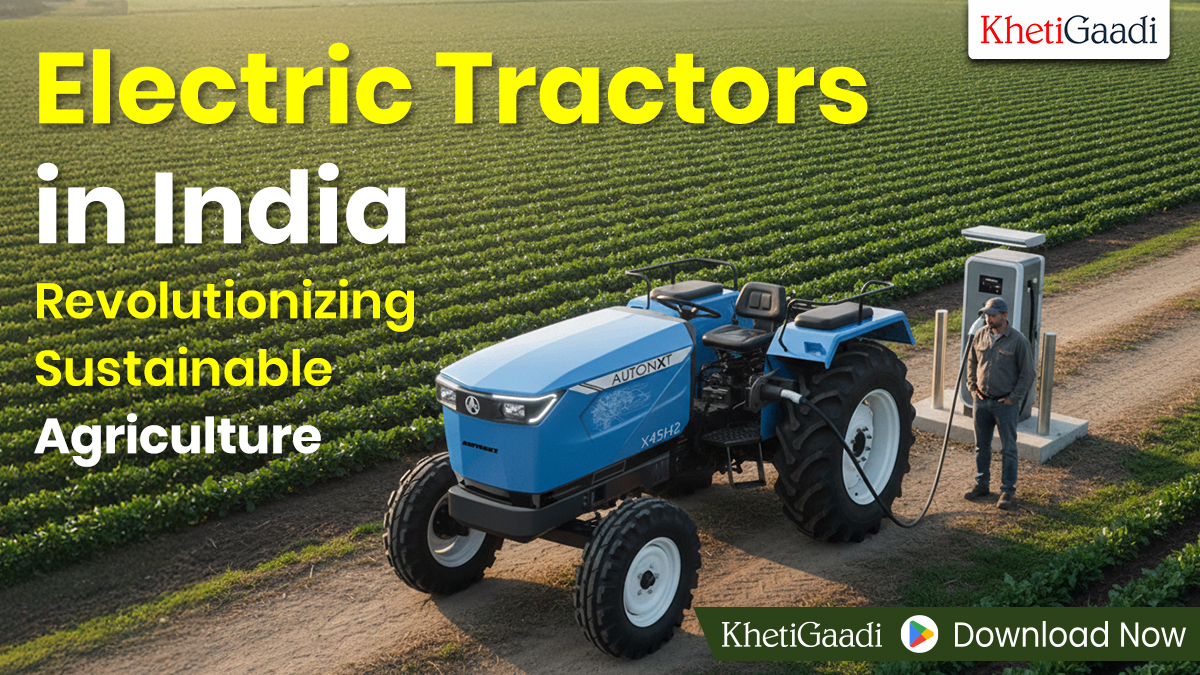With the increasing focus on sustainable and eco-friendly farming practices, electric tractors are making their way into the Indian agricultural landscape. These machines offer a modern solution to traditional diesel tractors by reducing carbon emissions and bringing down operating costs. Given India’s strong push towards green initiatives, electric tractors not only align with these goals but also offer practical advantages for farmers looking to maximize productivity and sustainability.
In this article, we’ll explore the benefits of electric tractors, how they can enhance agricultural productivity, the latest market trends, price ranges, popular brands, and practical maintenance tips.
Benefits of Electric Tractors
- Eco-Friendly: Electric tractors significantly reduce greenhouse gas emissions, making them ideal for sustainable farming. Unlike diesel engines, they don’t produce exhaust emissions, reducing air pollution and promoting a healthier environment.
- Lower Operating Costs: Electricity is generally cheaper than diesel, resulting in lower operating expenses. Additionally, electric tractors have fewer moving parts, leading to reduced maintenance costs over time.
- Less Noise Pollution: Electric tractors operate quietly, which benefits both farmers and surrounding communities, especially during night-time farming operations.
- High Torque Performance: Electric motors provide instant torque, which is beneficial for tasks requiring high power at lower speeds, like ploughing or tilling, improving productivity.
- Government Incentives: The Indian government has launched several schemes and subsidies to promote green farming practices, which include incentives for electric tractors. This makes it easier for farmers to access modern, eco-friendly machinery at a lower cost.
Uses of Electric Tractors in Farming
Electric tractors can handle various tasks across different farming stages. Here are some applications:
- Ploughing and Tilling: The torque provided by electric motors is ideal for soil preparation.
- Harvesting and Transporting: Electric tractors can transport produce across farms efficiently, and with battery charging solutions becoming more accessible, range and uptime are less of a concern.
- Spraying and Fertilizing: Equipped with precise control systems, electric tractors can carry out accurate spraying and fertilizing operations, helping farmers avoid wastage and minimize chemical usage.
- Seeding and Planting: Their fine-tuned control allows for even planting, which contributes to a uniform crop yield.
- Haulage Tasks: For farmers with small and medium-sized lands, electric tractors are perfect for moving farm inputs and produce efficiently.
Increasing Produce with Electric Tractors
Switching to electric tractors offers several ways to boost productivity and profit:
- Reduced Downtime: Electric tractors require less frequent maintenance, reducing downtime and allowing farmers to maximize their work hours.
- Improved Precision Agriculture: Electric tractors equipped with GPS and IoT technology enable more precise farming, optimizing planting, watering, and harvesting schedules for higher yields.
- Cost Savings: Lower fuel and maintenance costs mean farmers can allocate resources to other yield-enhancing inputs like better seeds, fertilizers, or advanced irrigation systems.
- Sustainability Appeal: Producing sustainably is not only environmentally friendly but also improves the market appeal of the produce, opening doors to premium markets, especially in urban centres focused on organic and eco-friendly products.
Current Trends in the Indian Electric Tractor Market
Rise in EV Demand:
With India’s push toward electric vehicles (EVs) across all sectors, agricultural machinery is joining this transition. Government policies such as the FAME II scheme and various state incentives are encouraging manufacturers to innovate in electric tractor technology.
Investment in Battery Technology:
Manufacturers are investing heavily in battery improvements to extend tractor runtime. Lithium-ion batteries are becoming more common in electric tractors due to their higher energy density and longer life.
IoT-Enabled Smart Features:
Indian farmers are increasingly tech-savvy, and electric tractors with smart features such as GPS tracking, IoT connectivity, and remote monitoring are in demand. These features allow farmers to monitor and optimize their operations in real-time.
Affordable Financing Options:
Financial institutions and companies are collaborating to provide farmers with easy financing options. With subsidies and easy loans, electric tractors are becoming more affordable.
Diversification in Brands and Models:
As the electric tractor market grows, more brands are entering the field with a range of options suitable for various farm sizes and tasks.
Electric Tractor Brands in India – Power and Price
| Brand | Model | Power (HP) | Price Range (INR) |
| Solectrac | e25 | 25 HP | ₹5 – ₹7 lakhs |
| John Deere | SESAM Concept | 130 HP | Prototype – Price TBD |
| Mahindra Electric | Mahindra Treo Zor | 20 HP | ₹6 – ₹8 lakhs |
| Escorts Electric | Electric Farmtrac | 60 HP | ₹10 – ₹12 lakhs |
| TAFE Electric | TAFE 7525 eTrac | 75 HP | ₹8 – ₹10 lakhs |
| ETractor Co. | eTrac Compact | 30 HP | ₹6 – ₹7 lakhs |
Note: Prices may vary based on region, subsidies, and other factors.
Easy Finance and Government Subsidy Schemes
To support farmers in adopting green technology, various financial institutions and companies offer easy financing schemes for electric tractors in India. These schemes aim to reduce the financial burden on farmers by providing low-interest loans, installment payment options, and flexible repayment plans. Leading banks and agribusiness finance firms are working with tractor manufacturers to make electric tractors more accessible through customized loan packages that fit the income cycles of farmers. Additionally, these schemes often come with quick processing times and minimal paperwork, enabling farmers to purchase modern equipment without extensive financial strain.
The Indian government is also supporting the shift to sustainable farming by offering subsidies under programs like the Faster Adoption and Manufacturing of Electric Vehicles (FAME II) scheme. While FAME II primarily focuses on electric vehicles, some state governments have extended these benefits to include agricultural EVs like electric tractors. These subsidies can cover a portion of the purchase price, making electric tractors more affordable. Additionally, certain state-specific agricultural subsidy programs provide grants or discounts to encourage farmers to invest in eco-friendly machinery, helping reduce upfront costs and improve long-term savings for farmers switching to electric tractors.
Important Maintenance Tips for Electric Tractors
- Regular Battery Check: Ensure the battery is fully charged and check for any signs of damage or corrosion.
- Cooling System Care: Electric motors need proper cooling, so regularly clean the cooling systems to prevent overheating.
- Software Updates: For tractors with IoT or GPS, keep software updated for optimal performance and data security.
- Inspect Electrical Connections: Check all wiring and connections for wear and tear, especially after intense use or adverse weather.
- Tire Pressure Maintenance: Correct tire pressure ensures efficient energy usage and prevents excessive battery drain.
- Brake System Inspection: Regularly inspect and maintain brakes for safe operation on different terrains.
- Monitor Battery Health: Invest in a battery management system to monitor health and avoid overcharging.
- Lubricate Moving Parts: While electric tractors have fewer moving parts, regular lubrication helps avoid wear on essential components.
- Avoid Overloading: Avoid exceeding load capacity, as it can damage the motor and reduce battery life.
- Scheduled Professional Check-Ups: Regular servicing by professionals can help catch issues early and keep your tractor running efficiently.
Conclusion
Electric tractors are shaping the future of sustainable agriculture in India. They offer a practical, cost-effective alternative to diesel-powered machinery and support farmers in their pursuit of higher yields and eco-friendly practices. As technology evolves, electric tractors are expected to become more affordable and feature-rich, making them accessible to an even wider range of farmers.
Reference Links
Ministry of Agriculture, Government of India
FAME II Scheme Information (for electric vehicle subsidies)




